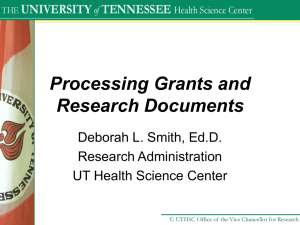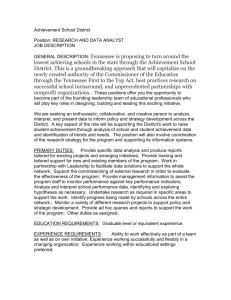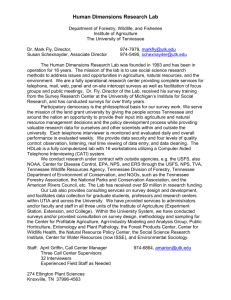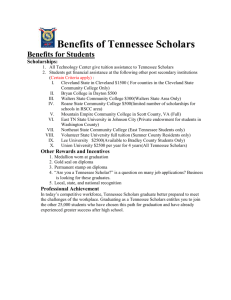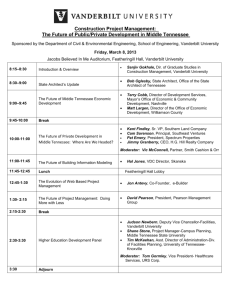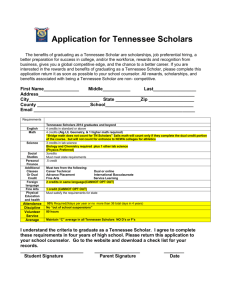Institutional Compliance Plan - Office of Institutional Compliance
advertisement
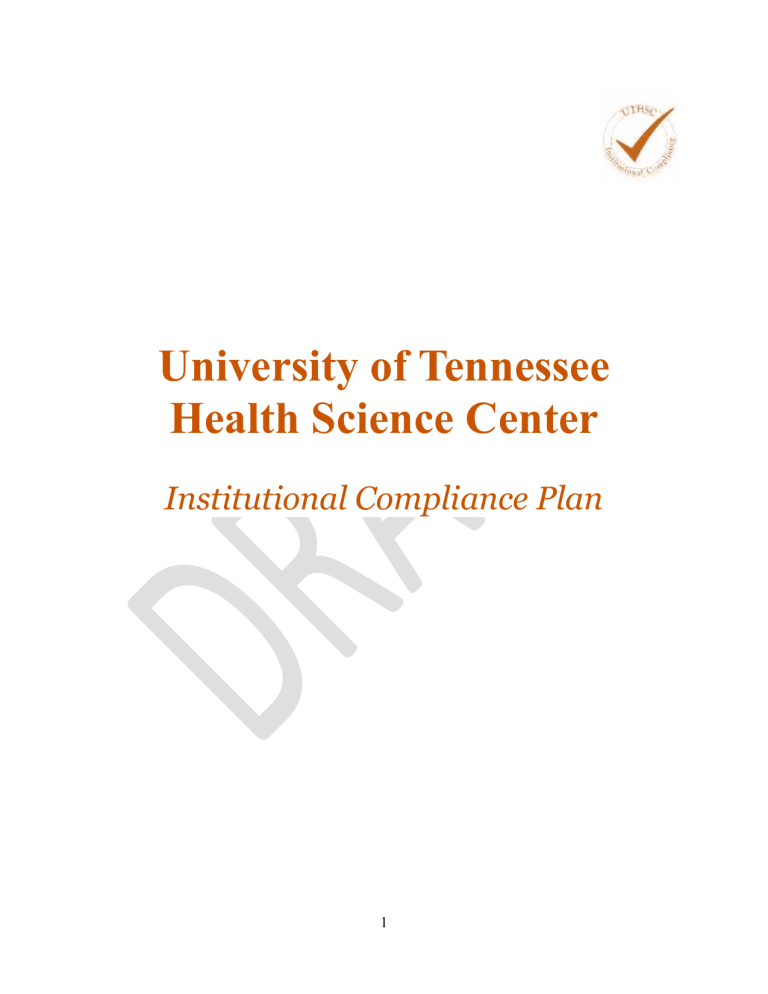
University of Tennessee Health Science Center Institutional Compliance Plan 1 Table of Contents Introduction I. II. III. IV. V. VI. VII. VIII. IX. 3 Mission Statements Defined Terms Standards of Conduct & Ethics Compliance Oversight Compliance Awareness, Education & Training Criminal Background and Sanction Checks Monitoring & Risk Assessment Reporting Responsibilities & Resources Response & Corrective Action 2 4 4 5 5 7 9 9 9 11 INTRODUCTION The University of Tennessee Health Science Center (UTHSC) has six accredited health science colleges, and clinical and academic centers throughout Tennessee. UTHSC is subject to numerous laws, rules and regulations as an academic, research and patient care center. Failure to comply with these laws, rules and regulations could adversely impact UTHSC’s ability to continue these activities. Therefore, UTHSC is committed to conducting its activities in a truthful and ethical fashion and in compliance with applicable laws, regulations, University of Tennessee System policies, and UTHSC procedures. UTHSC, through its Vice Chancellor for Finance and Operations, adopts this Institutional Compliance Plan (“Plan”) to provide an institutional compliance environment supportive of existing regulatory compliance oversight efforts. It is based on the Federal Sentencing Guidelines standards for an effective compliance program and the Department of Health and Human Services Office of Inspector General’s compliance guidance. This Plan is not intended to substitute for or diminish any other UTHSC or University of Tennessee System policy or program, but to supplement existing policies and procedures that, in whole or in part, address compliance issues. Ethical and compliant behavior is an institutional as well as an individual responsibility. Each member of the UTHSC community, student faculty, staff, volunteer, visitor, or independent contractor, is expected to conduct his or her activities ethically and truthfully in accordance with applicable laws, regulations, system policies and campus procedures. This Institutional Compliance Plan is designed to provide the UTHSC community with resources to enhance their knowledge of applicable laws, regulations, policies and procedures so they conduct their activities in a manner that reduces the risk of noncompliance. 3 MISSION STATEMENTS University of Tennessee Health Science Center The mission of the University of Tennessee Health Science Center is to bring the benefits of the health sciences to the achievement and maintenance of human health, with a focus on the citizens of Tennessee and the region, by pursuing an integrated program of education, research, clinical care, and public service. University of Tennessee Health Science Center Office of Institutional Compliance The mission of the University of Tennessee Health Science Center Office of Institutional Compliance is take a proactive approach in promoting compliance with applicable laws and regulations as well as UT System policies and UTHSC procedures. The office will strive to provide education, training, and direction to all faculty and staff members. DEFINED TERMS These terms are defined for purposes of this Plan as follows: UTHSC employees include full and part-time faculty, residents, staff and others employed by UTHSC who receive salary compensation that is included in IRS W-2 wage and tax statement forms. UTHSC community includes, but is not limited to UTHSC employees, as well as students, independent contractors, vendors, and volunteers throughout the various campuses, locations and sites, inside and outside of Tennessee. Regulatory Oversight Committees/Areas refers to existing and/or future Committees and/or Departments that have responsibility for certain regulatory areas, including, but not limited to, the Institutional Review Board, Institutional Animal Care and Use Committee, Environmental, Health and Safety, Medical Billing Compliance, Radiation Safety, Research, Title IX Compliance and Human Resources. Fraud, Waste, and Abuse – refer to UT Policy FI0130. Violation of Law means failure or refusal to follow any applicable state or federal law such that criminal and/or civil penalties may be imposed. Noncompliance means failure or refusal to follow applicable state or federal laws or institutional/system policies and procedures. It can include acts that are negligent and unintentional as well as intentional acts that constitute fraud and/or violations of law or institutional/system ethical standards. 4 STANDARDS OF CONDUCT & ETHICS The UTHSC community is expected to comply with all applicable laws, regulations, policies and procedures. For the University of Tennessee System Code of Conduct policy refer to policy HR0580. COMPLIANCE OVERSIGHT UTHSC has an Office of Institutional Compliance and has designated a Compliance Committee to assist in the development and oversight of the UTHSC Institutional Compliance Plan. The Office of Institutional Compliance together with the Compliance Committee is responsible for implementing and monitoring a continuous, collaborative and proactive culture of compliance at UTHSC. A. GOVERNING AUTHORITY The Board of Trustees is the governing body of The University of Tennessee. The Board is comprised of five ex officio members (the Governor, Commissioner of Agriculture, Commissioner of Education, Executive Director of Tennessee Higher Education Commission, and the President of the University) and twenty-one members appointed by the governor. The President of the University of Tennessee is appointed by and is an ex officio member of the University of Tennessee Board of Trustees. The UTHSC Chancellor reports to the President. The Chancellor has general authority and responsibility for administration of UTHSC. B. UTHSC INSTITUTIONAL COMPLIANCE COMMITTEE a. Membership The UTHSC Vice Chancellor for Finance and Operations appoints the members of the Compliance Committee. b. Meetings The Compliance Committee shall meet at least four times each year. c. Roles and Responsibilities i. Review and approve the Institutional Compliance Plan (updated annually) ii. Provide oversight and guidance of investigations of alleged or suspected compliance issues being conducted by the Office of Institutional Compliance iii. Ensure that the Compliance Program considers all aspects of the Campus’ operations iv. Ensure continuous and effective monitoring of identified high-risk activities v. Complete risk assessment and assist in the periodic, System-wide compliance risk assessment and prepare plan of action for noncompliance areas vi. Follow-up on all instances of non-compliance reported to the Committee to ensure appropriate corrective action has been taken by management C. OFFICE OF INSTITUTIONAL COMPLIANCE 5 a. Office of Institutional Compliance The Office of Institutional Compliance (OIC) reports to the Vice Chancellor for Finance and Operations and has overall responsibility for the implementation and effectiveness of the UTHSC Institutional Compliance Plan. b. Responsibilities of the OIC The OIC shall: i. Oversee and monitor implementation of the UTHSC Compliance Plan ii. Develop and periodically review and update the Institutional Compliance Plan and related policies consistent with the elements of an effective compliance program iii. Develop, coordinate and implement a compliance training program that addresses general compliance training for all employees and other training as necessary to promote compliance awareness iv. Serve as an institutional resource and support for regulatory oversight v. Monitor compliance activities and high risk areas as identified and outlined in the quarterly work plan and risk assessment and assist in the periodic, System-wide compliance risk assessment and coordinate the resolution of identified issue vi. Publicize the UTHSC Compliance Hotline and other reporting avenues and coordinate investigations of alleged noncompliance vii. Maintain current knowledge of laws and regulations that may affect UTHSC procedures while sharing best practices and communicating that information viii. Identify new areas of compliance oversight as they arise ix. Management oversight of clinical billing and HIPAA privacy and security compliance activities x. Serve as primary contact for any external government audits related to institutional, billing or HIPAA privacy and security compliance concerns and assist other regulatory oversight areas, as needed, in addressing government audits of their areas 6 COMPLIANCE AWARENESS, EDUCATION & TRAINING A. COMPLIANCE AWARENESS The UTHSC Compliance Plan will be posted to the UTHSC website. The OIC will periodically post information in various resources regarding the Plan and related policies to raise awareness regarding general and specific compliance issues. B. COMPLIANCE EDUCATION Compliance training is a vital element of an effective compliance program. UTHSC is committed to providing general and specific compliance training so that employees understand their responsibilities in accordance with applicable laws, regulations, policies and procedures. a. Introduction UTHSC employees shall complete general compliance training in addition to on-going specific training required for their position. Other individuals, such as students and contractors, may be required to complete general and/or specific compliance training before providing services on behalf of UTHSC. As new developments or concerns arise, UTHSC may require additional training for some or all UTHSC employees, students and/or contractors. Employees are expected to complete required compliance training within the time frames and frequencies established by the department or committee requiring and/or providing the compliance training. Notification of compliance training requirements will be communicated through various means, including, but not limited to internet/intranet, email, written memorandum, and/or supervisors. General and specific compliance training and related information shall be periodically reviewed and updated to address current risk areas and improvement opportunities. b. General Compliance Training The Office of Institutional Compliance shall be responsible for developing the content and delivery of general compliance training for UTHSC. The content of the general compliance training will include, but is not limited to, an overview of pertinent laws and regulations, the UTHSC Compliance Plan, UTHSC high-risk areas, roles and responsibilities and other information necessary to maintain an effective general compliance training program. General compliance training will be available on the UTHSC Office of Institutional Compliance website. 7 c. Specific Compliance Training It is the responsibility of the individual or department having regulatory compliance oversight to develop the content and deliver specific compliance training related to its area of regulatory oversight responsibility. The content of the training shall include those areas mandated by law, regulation and/or policy and procedure and may include a review of relevant laws and regulations applicable to that regulatory compliance area, identified or potential risk areas, responsibilities, and methods to improve compliance. Specific compliance training includes, but is not limited to training for the Institutional Review Board (IRB), Institutional Animal Care and Use Committee (IACUC), Institutional Biosafety Committee (IBC), Safety Affairs, Human Resources, and Billing/Privacy Compliance, and other training as may be required by law, regulation and/or UT system/UTHSC policy. Specific compliance training requirements shall be communicated by the department responsible for the content and delivery of the specific compliance training. d. Training Reporting and Maintenance Records of completion of compliance training shall be maintained by the department responsible for delivery of the education in accordance with institutional/regulatory guidelines. Summary reports of compliance with required compliance training shall be compiled by the department responsible for the training at least annually or more often as necessary and submitted to the Office of Institutional Compliance. Copies of all general and specific compliance training materials (electronic and/or hard copy) shall be retained in accordance with UT Policy FI0120 – Records Management and/or legal and regulatory requirements, whichever is more stringent. C. MANAGER AND SUPERVISOR RESPONSIBILITIES The implementation and adherence to the Institutional Compliance Plan by all managers and supervisors is considered an integral part of their job performance. Those persons serving in management or supervisory positions at UTHSC (to include faculty, etc…) shall receive notice, by the Office of Institutional Compliance, of those who need to complete compliance training and are ultimately responsible to make sure that each UTHSC employee reporting to them has completed the required compliance training applicable to that person. This notice will apply to those who have not timely completed compliance training. Completion of required training will be monitored and documented by the Office of Institutional Compliance. Managers and supervisors shall: Complete all required compliance training for their own respective position. Inform employees of required compliance training specifically related to their job function and appropriately monitor employees to verify that employees complete all mandatory compliance training. D. CORRECTIVE ACTION 8 Compliance training is required of all employees and is a condition of employment with UTHSC. It is the responsibility of the manager or supervisor to take appropriate actions, including disciplinary action, for employees who fail to timely complete UTHSC mandatory training. This should be done in coordination with the Office of Institutional Compliance, Human Resources, and/or Office of Academic, Faculty and Student Affairs as deemed appropriate. CRIMINAL BACKGROUND AND SANCTION CHECKS All employees are subject to a pre-hire criminal background check and Sanction check. Some Departments may designate certain positions as requiring a criminal background check for both new hires as well as transfer by current employees. See UTHSC Human Resource procedure on Background, Reference and Education Verification. https://www.uthsc.edu/hr/employment/verification.php MONITORING & RISK ASSESSMENT A. COMPLIANCE AWARENESS The Office of Institutional Compliance shall be responsible for conducting routine monitoring of UTHSC compliance policies and activities, including activities of Regulatory Oversight Committees/Areas based upon risks identified as part of the on-going risk assessment or as otherwise directed by the Institutional Compliance Committee. B. ONGOING RISK ASSESSMENT The Office of Institutional Compliance shall conduct ongoing risk assessments of UTHSC activities to identify potential risk areas. REPORTING RESPONSIBILITIES & RESOURCES A. REPORTING RESPONSIBILITY Reporting suspected fraud, sexual misconduct, violations of policy or law or noncompliance is essential to the effectiveness of the UTHSC Institutional Compliance Plan. UTHSC employees and students shall report suspected violation of, or non-compliance with, federal or state laws, and/or UT System policies or UTHSC procedures. Any member of the UTHSC community who has a reasonable basis for believing fraud, violation of laws or other noncompliance has occurred has a responsibility to promptly notify his/her supervisor, Title IX Compliance Officer, Campus Police, Human Resources (as applicable), the Office of 9 Institutional Compliance, UT System Office of Audit and Compliance (as noted in Fiscal Policy FI0130), or use the external confidential Hotline (See Section B below). Some of those policies and their reporting procedures are located at the following links: HR 0580 Code of Conduct - http://policy.tennessee.edu/hr_policy/hr0580/ FI0130 - http://policy.tennessee.edu/fiscal_policy/fi0130/ Sexual Misconduct and Relationship Violence Policy - https://www.uthsc.edu/oed/sexualmisconduct.php An employee who makes a report that is later found to have been intentionally false or made maliciously without regard for truth may be subject to disciplinary action, up to and including termination of employment or dismissal from the University. This provision does not apply to reports made in Good Faith, even if the facts alleged in the report are not substantiated by an investigation. Similarly, a Respondent or other person who is later proven to have intentionally given false information during the course of a University investigation or disciplinary proceeding action may be subject to disciplinary action, up to and including termination of employment or dismissal from the University. False reporting is considered a felony in Tennessee under state law. B. COMPLIANCE HOTLINE The UTHSC community is encouraged to attempt resolution of concerns through established channels whenever possible. If someone desires to report a concern anonymously, they can use the State Audit’s Hotline (1-800-232-5454). C. NON-RETALIATION POLICY UTHSC procedures prohibits acts to retaliate, intimidate, threaten, coerce or otherwise discrimination against any person who in good faith opposes, reports a practice which he/she believes to be discriminatory, or exercises their rights or responsibilities, or who participates in an investigation of a complaint or noncompliance or violation of the law. Retaliation is a violation of policy regardless of whether the underlying allegation of a violation of policy is ultimately found to have merit. D. CONFIDENTIAL AND ANONYMOUS Reports will be handled and investigated in a confidential and anonymous manner subject to existing policies (including faculty or student handbooks) and to the extent allowed by law. 10 RESPONSE AND CORRECTIVE ACTION A. RESPONSE TO ALLEGATIONS All reports of suspected fraud, violation of law and/or non-compliance shall be tracked and investigated by the responsible departments/offices. Allegations of suspected violation of law or non-compliance shall be reviewed and investigated, if necessary, by the responsible area, and, if appropriate, with the assistance of the Office of Institutional Compliance (OIC) in conjunction with the UT System Office of Audit and Compliance. A written report of each investigation by the OIC shall be prepared, to include findings and recommendations and marked confidential in accordance with this Plan. A summary report of all OIC compliance investigations shall be provided to the Institutional Compliance Committee and the UT System Office of Audit and Compliance. The committee has the authority to require action in addition to those recommended by the investigating entity/individual. UTHSC students, faculty and staff shall cooperate during any compliance investigation and shall not alter or destroy any documentation during the course of the investigation. B. CORRECTIVE ACTION & APPEAL RIGHTS Failure or refusal to comply with this Plan, applicable laws, regulations and/or UT System policies or UTHSC procedures may result in corrective action. An employee’s supervisor, Chair, or Dean may also be subject to corrective action when he/she: Directs or approves the employee’s improper actions Is aware of the improper actions and fails to correct them Corrective action may also be imposed where an employee should have detected, but failed to detect fraud, a violation of law or non-compliance. Correction under HR0525 Disciplinary Action Policy, may include, but is not limited to, any of the following actions: Mandatory training Corrective action Increased monitoring/auditing Reclassification or reassignment of duties Suspension of billing privileges for health care providers, Termination of employment or contractual relationship Appeals rights are afforded in accordance with existing policies and statues. 11
